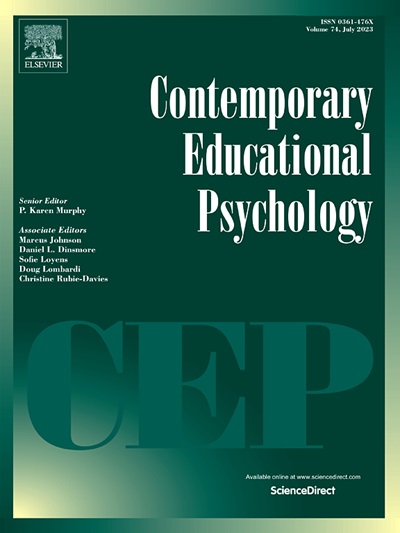Effects of self-explaining feedback on learning from problem-solving errors
IF 3.9
1区 心理学
Q1 PSYCHOLOGY, EDUCATIONAL
引用次数: 0
Abstract
We tested two potential ways to help students learn from feedback on their problem-solving errors in physics: (a) design the feedback to align with established principles of multimedia learning (Experiment 1), and/or (b) explicitly prompt students to generate self-explanations of their errors (Experiment 1 and 2). Experiment 1 (n = 131) found no effect of feedback design and limited effects of self-explaining: Self-explaining improved error correction and near (but not far) transfer performance for only one of the feedback conditions. In Experiment 2 (n = 110), we tested a more explicit form of self-explanation support. Students who received scaffolded self-explanation prompts generated higher quality explanations, corrected more errors, and performed better on the near (but not far) transfer test than those who received standard self-explanation prompts or a control group who received no prompts. Students receiving standard self-explanation prompts did not significantly outperform the control group. Overall, this study suggests scaffolded self-explanation prompts help students correct and avoid similar problem-solving errors in the future.
自我解释反馈对从问题解决错误中学习的影响
我们测试了两种潜在的方法来帮助学生从物理问题解决错误的反馈中学习:(a)设计反馈以符合多媒体学习的既定原则(实验1),和/或(b)明确提示学生对自己的错误进行自我解释(实验1和2)。实验1 (n = 131)发现反馈设计没有效果,自我解释的效果有限。自解释改进的纠错和近(但不是远)传输性能,只有一个反馈条件。在实验2 (n = 110)中,我们测试了一种更明确的自我解释支持形式。与接受标准自我解释提示的学生或没有接受提示的对照组相比,接受脚手架式自我解释提示的学生产生了更高质量的解释,纠正了更多的错误,并且在近(但不是远)转移测试中表现更好。接受标准自我解释提示的学生并没有明显优于对照组。总的来说,这项研究表明,脚手架式的自我解释提示有助于学生纠正和避免未来类似的问题解决错误。
本文章由计算机程序翻译,如有差异,请以英文原文为准。
求助全文
约1分钟内获得全文
求助全文
来源期刊

Contemporary Educational Psychology
PSYCHOLOGY, EDUCATIONAL-
CiteScore
16.50
自引率
3.90%
发文量
74
期刊介绍:
Contemporary Educational Psychology is a scholarly journal that publishes empirical research from various parts of the world. The research aims to substantially advance, extend, or re-envision the ongoing discourse in educational psychology research and practice. To be considered for publication, manuscripts must be well-grounded in a comprehensive theoretical and empirical framework. This framework should raise critical and timely questions that educational psychology currently faces. Additionally, the questions asked should be closely related to the chosen methodological approach, and the authors should provide actionable implications for education research and practice. The journal seeks to publish manuscripts that offer cutting-edge theoretical and methodological perspectives on critical and timely education questions.
The journal is abstracted and indexed in various databases, including Contents Pages in Education, Australian Educational Index, Current Contents, EBSCOhost, Education Index, ERA, PsycINFO, Sociology of Education Abstracts, PubMed/Medline, BIOSIS Previews, and others.
 求助内容:
求助内容: 应助结果提醒方式:
应助结果提醒方式:


